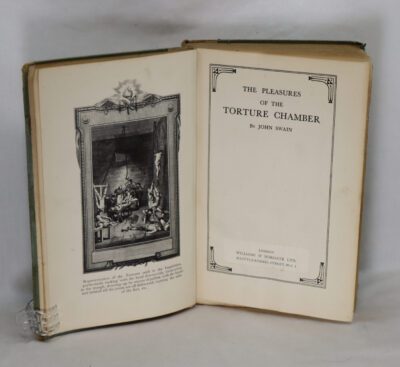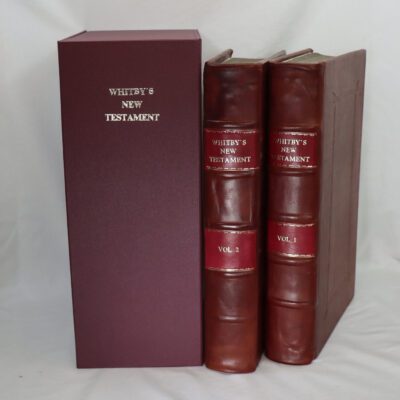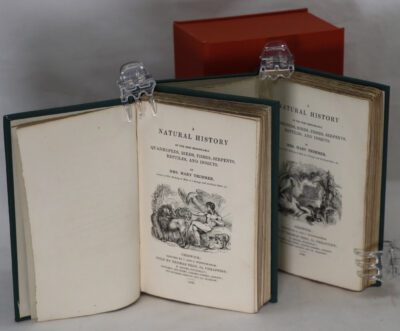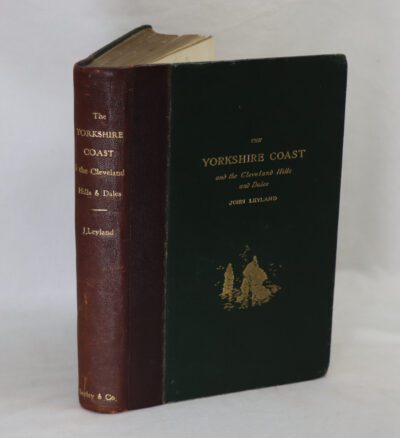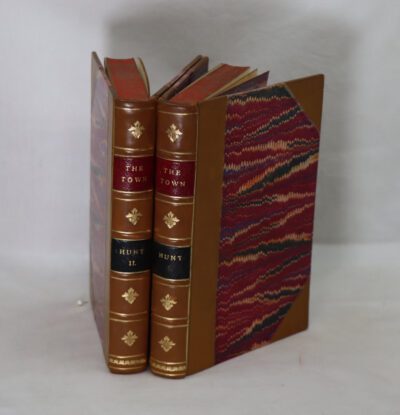Fordyce's Addresses. Volumes 1 & 2.
By James Forsythe D.D.
Printed: 1777
Publisher: T. Cadell. London
| Dimensions | 11 × 17 × 3.5 cm |
|---|
Language: Not stated
Size (cminches): 11 x 17 x 3.5
Condition: Fine (See explanation of ratings)
FREE shipping
Your items
Item information
Description
Full brown leather binding with red title pate, gilt banding, decoration and lettering on the spine. Gilt border decoration on both boards.
Name plate of Lord Chief Justice Wilde on the pastdown.
First Edition – ‘Addresses to Young Men,’ 1777, 2 vols.
Addresses to Young Men is a collection of 16 sermons written and compiled by the Reverend James Fordyce, a Scottish minister. The sermons cover subjects such as honour, love, friendship, humility and fame. The collection was published in 1777, the year after the publication of Fordyce’s hugely popular Sermons to Young Women. This is the two-volume second edition, published in the same year as the original edition.
What values does it promote?
Addresses to Young Men emphasises the important role those young men have in shaping society. Because of this, they deserve respect from others and should respect themselves; Addresses I and II are titled, respectively, ‘On the Respect due to Young Men’ and ‘On the Reverence which Young Men owe to themselves’. Fordyce describes ‘self-reverence’ as ‘one of the first and most comprehensive rules of right practice’. However, this must be mixed with humility, which is the subject of Address XV. He places the virtues he admires within a Christian framework, referring repeatedly to God, biblical stories and the importance of religious piety. He also stresses how easily young men can be led astray by bad influences.
Comparing Addresses to Young Men and Sermons to Young Women
The emphasis on self-esteem in Addresses to Young Men is very different from Fordyce’s message in Sermons to Young Women, in which he urges his female readers to be obedient and meek. In A Vindication of the Rights of Women, Mary Wollstonecraft criticises Sermons to Young Women, protesting that ‘moralists’ such as Fordyce expect all women to have the same character of ‘yielding softness and gentle compliance’, whereas they allow men ‘to cultivate, as nature directs, different qualities and assume … different characters’. Fordyce exhibits this attitude towards men in Addresses to Young Men, writing that there is a ‘great diversity’ in the personalities of young men, and as a result each one must be treated differently, according to his particular ‘tendencies and manners’.
James Fordyce, DD (1720–1 October 1796), was a Scottish Presbyterian minister and poet. He is best known for his collection of sermons published in 1766 as Sermons for Young Women, popularly known as Fordyce’s Sermons.
He was the third son of George Fordyce (1663–1733) of Broadford, merchant and Provost of Aberdeen (who had twenty children); and was born at Aberdeen in the last quarter of 1720. David Fordyce was his elder brother, Alexander Fordyce and Sir William Fordyce were his younger brothers, and George Fordyce, M.D., was his nephew. After the Aberdeen High School Fordyce went to Marischal College, where he was educated for the ministry. On 23 February 1743 he was licensed by the Aberdeen presbytery.
In September 1744 he was presented by the Crown to the second charge at Brechin, Forfarshire. His admission was delayed, when the parishioners stood out for their right of election; he was ordained at Brechin on 28 August 1745. His position was not comfortable, and he did not get on with his colleague. In 1753 he took his degree of M.A. at Marischal College, and in the same year he received a presentation to Alloa, Clackmannanshire. The parishioners wanted another man; however, Fordyce got a call on 5 June, demitted his charge at Brechin on 29 August, and was admitted at Alloa on 12 October 1753. Here he was on better terms with his congregation and acquired a reputation as a preacher. He published several sermons; in 1760 his sermon before the General Assembly on the ‘folly, infamy, and misery of unlawful pleasures’ created an impression. The University of Glasgow made him a Doctor of Divinity.
Want to know more about this item?

Related products
Share this Page with a friend






